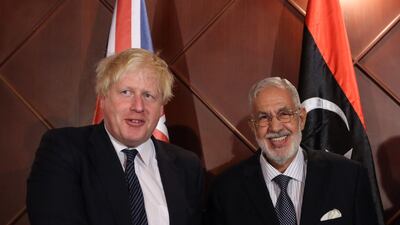The hopes for a new democratic age following the downfall of Muammar Qaddafi was hopelessly over-optimistic, the British foreign secretary said Friday as he urged Libyan politicians to suppress their selfish interests for the good of the country.
Boris Johnson said that power struggle between rival militias had created lawless areas where terrorism could incubate and was a powerful incentive to get the country finally under control seven years after a Nato coalition removed the former Libyan strongman.
Johnson was speaking after returning from meeting Libyan commander Khalifa Haftar in Benghazi on Thursday when he urged him to keep to a ceasefire announced in Paris last month as the United Nations leads efforts to end fighting in the country.
The country has had rival governments in the east and west since 2014 and has become the main departure point for migrants catching boats to Europe.
Haftar, who fell out with Qaddafi in the 1980s, is the dominant figure in the east of the country and has spurned the UN-backed Government of National Accord while making military gains on the ground.
He remains a divisive figure with critics saying they fear a return to military rule. At the Paris meeting he agreed a ceasefire and elections next year but quickly played down the commitments.
“We of course were way over optimistic about what would happened when we got rid of Qaddafi,” Mr Johnson told the BBC. “We thought the elections of 2014 would be a solution, in fact they only made things worse.
“Politicians in Libyan need to suppress their own selfish interests and compromise for the good of the country.”

